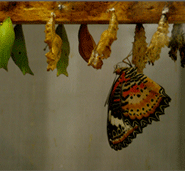Summer evenings of Delhi in the 90’s saw many power cuts.
We lived in a Delhi Development Authority colony. The DDA designed these flats for India’s growing middle class. The architecture was uniform, with little heed to aesthetics. The houses were originally painted a sulphuric yellow but over time residents indulged daringly in fifty shades of chalky pink. They began the size of matchboxes, and gradually gave way to balconies: the buildings morphed with their inhabitant’s ideologies. Since the colony was designed during India’s glorious socialist past, all houses were built around parks. The idea was to encourage residents to meet, mingle, debate. But the Iron Curtain had fallen, India had liberalized and community had given way to cable television. There was still evening cricket though. Dust rising from the makeshift pitch. The young boys always fielding while the older, bigger ones spend the entire evening batting. Conversation was no longer the purpose of the park, but at least there was cricket.
Power cuts were a common occurrence. Usually well timed by the Delhi government, darkness happened upon us just after the 9 o clock news, after dinner, after homework but before bedtime. The predictability of the power cut didn’t take away from the excitement that it brought to everyone.
As soon as the lights turned off, after a hustling scramble for slippers, we would run down in various forms of dress and undress. Power cuts meant late night hide and seek. It was the most natural thing to do. There was never any debate on what we’d play that day. Suggestions like “lets play something else tonight” were not entertained. The weak were coerced into the game via ghost story or scary sounds. The methods of blackmail in the darkness carried little subtlety and a lot of innocent cruelty.
Because it was dark, there were two dens or ‘It’s. The boundary was made up of the surrounding flats that circled the park. No stairs, no roofs. If you went outside the boundary, obviously, you were den. After some debate, usually the oldest would be made den along with a young, hesitant companion who had probably been the last one to say “notmyden”. The eldest would pretend not be afraid of the dark and turn around and start to count, loudly “ticktick ONE”. The rest of us would scurry around for the best hiding spots before the den got to “tick tick TWENTY”. The older, cocky kids waited till he got to “Tick tick FIFTY”. Hiding places abounded: behind bushes, under parked cars, or even under the sari pallus of aunties sitting in the park, chatting about the errant milk boy. The best option, however, was to hide all together, face the wall under the staircase and exchange our clothes. We were young, flat-chested and wore tiny slips under our shirts. Without hesitance or shame, we would disrobe and swap. It wasn’t a problem; it was for the sake of the game. So we could hide better, longer. The den had to call each of our names, so being someone else was really, really smart. The best games were the ones in which you never get caught, or the ones in which the den would call out the wrong names and you have the satisfaction of a victory dance and the den an incomprehensible, mathematical annoyance, frowning, “ticktick ONE…”
Every evening the lights would return just before 11 ‘O’ clock and the colony would be enveloped in a collective groan. The game was over and it was time to go back upstairs, set your bag and go to bed. Some times we would forget to swap our shirts, much to the befuddlement of our elders. Some times we would even forget whose shirt we had on but none of it mattered because we had succeeded in not getting caught by the big, bad den.
We wished for those power cuts despite the heat and candle-lit houses. It gave all of us a sense of adventure that was bigger than most things we had known, certainly the darkness was bigger than us, in all its Mystery and Dilation.
One day, my parents, who were now part of the socially mobile upper-middle class, brought home an invertor. A silent, square machine that lay passive in the balcony. We put flowers at its base and vermillion on its battery. It was to give us a power back up, a giver of light, we were told. If we ran one fan and two lights, then it would run for 8 hours but if we ran one fan and no lights, then we could watch TV for up to 6 hours.
Obviously, we were enchanted. Then that night, at about 9 pm, our anticipation was cut by no scramble for candles or hand fans. No reason to run out to hide and seek in the dark. Instead, inverted by the invertor, I sat around watching TV with one fan and no lights on.
Astha Kapoor grew up in Delhi and works in social development. In her free time she indulges in nostalgia.
Editor's Note.
This poem, by Tracy Smith, is a poem that I have found myself returning to. Not only does it play with scale--miniaturizing the giant and magnifying the tiny--but it pulls taut with it a fundamental tension that braces our existence. The tension between the cosmic and the earthly. When we spin around ourselves in a field, and the stars seem to be spinning too, why do our arms begin to pull away from our sides? Our local frame is inextricably linked to the rest of the universe.
Read MoreAlso in this issue
Illusion: Seeing Beyond Seeing
Meaning: In Search of Significance.
Melody: A Different Tune
Rhythm: Ordering Time

















